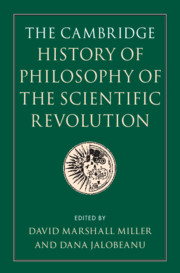Book contents
- The Cambridge History of Philosophy of the Scientific Revolution
- The Cambridge History of Philosophy of the Scientific Revolution
- Copyright page
- Contents
- Tables and Figures
- Contributors
- Preface
- Introduction The Disciplinary Revolutions of Early Modern Philosophy and Science
- Part I The Disciplines
- Part II Disciplinary Activities
- Part III Problems and Controversies
- Bibliography
- Index
Introduction - The Disciplinary Revolutions of Early Modern Philosophy and Science
Published online by Cambridge University Press: 14 January 2022
- The Cambridge History of Philosophy of the Scientific Revolution
- The Cambridge History of Philosophy of the Scientific Revolution
- Copyright page
- Contents
- Tables and Figures
- Contributors
- Preface
- Introduction The Disciplinary Revolutions of Early Modern Philosophy and Science
- Part I The Disciplines
- Part II Disciplinary Activities
- Part III Problems and Controversies
- Bibliography
- Index
Summary
Philosophical arguments must be understood in relation to the historical contexts in which they were produced. This yields the recognition that the distinction between early modern “philosophy” and “science” is an anachronistic imposition—the philosophical foundation of modernity and the Scientific Revolution are facets of the same transformations. However, the “contextualist turn” presents methodological difficulties arising from the opposition of philosophical analysis and historical narrative. This introduction presents two strategies for resolving these tensions in the study of the period. First, examination of how authors identified with peers and opposed themselves to foes generates a fine-grained understanding of early modern disciplines, without anachronistic impositions. Second, shifts in disciplinary boundaries can be used as entry points into the networks of influences that ramified across the intellectual landscape, yielding narratives that are sensitive to a wide range of textual and contextual factors. Together, awareness of disciplinary boundaries and their “inflection points” offers an updated methodology for the investigation of the early modern period. Anachronistic grand narratives of early modern philosophy and of the Scientific Revolution will be superseded by more modest but much more sophisticated accounts of the multiplication and reorganization of intellectual disciplines.
Keywords
- Type
- Chapter
- Information
- Publisher: Cambridge University PressPrint publication year: 2022



